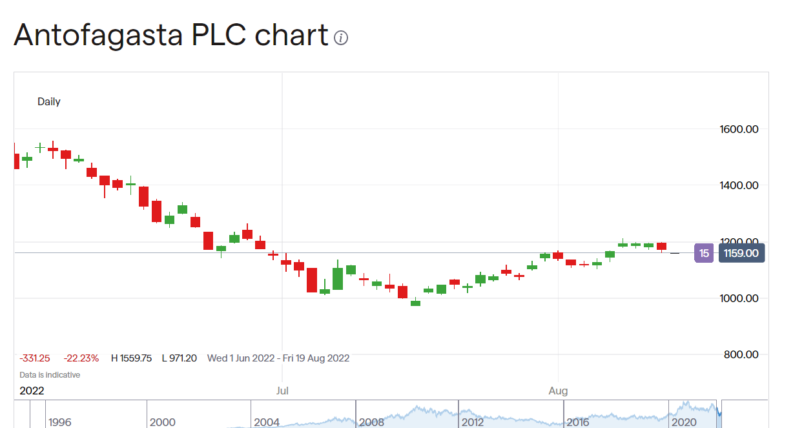Key points:
- Antofagasta has faced drought, mechanical breakdown and a falling copper price
- The big unknown though is a possible change in Chilean tax law
- A possible rise in tax to be paid would come straight off ANTO's bottom line
Antofagasta (LON: ANTO) shares have slipped back on the announcement of their half year results. They've been suffering from several distinct problems of which the most worrying for the long term is government action. As it so often is the most worrying problem of course. It's possible to utter a sigh of relief of course, for that Chilean constitutional convention was, at one point, talking of nationalising the mining industry. That didn't happen but the tax situation is still changing and not to ANTO's advantage.
Antofagasta is a copper miner based in Chile. There are other projects on the books and in development but near all revenue comes from those Chilean copper mines. As with every other operating miner this means that profits are dependent upon the global price for the output – this not being something that the miner has control over. Except at the tinest margin it's not really possible to market “premium” metals or ores so mines are price takers. The global copper price rose strongly recently on the back of the EV revolution and what that would mean for future consumption. It's since fallen back considerably given both supply increases and the worries of a recession.
Antofagasta has also been hit by a drought in Chile – copper mining and processing consumes vast quantities of water – and even the breakdown of a plant. All these are known information which is why the Antofagasta share price movement in response to their inclusion in the results has been so moderate – the share price movement had largely already happened that is.

Also Read: The Best Copper And Mining Stocks to Watch in 2022
The next problem is tax. It is, in economic and political terms, fair that miners should pay substantial taxation on the resource values. The miners didn't put the copper there after all, so why shouldn't governments collect that value? The problem is always that government tries to extract as much as it can – often enough more than the actual resource value and thereby biting into what should righteously be the mining profits. Profits made from the capital devoted, the labour performed rather than just there mere existence of the minerals in the first place.
It is true that the Chilean constitutional convention didn't recommend the nationalisation of the sector. But there is still this discussion about whether the tax upon mines should rise. Currently it runs at about 40% of value of output – the suggestion is that this should rise to 50%. That – of course – will simply come off the bottom line at Antofagasta. For the actual argument is how much of the copper value should go to the Chilean state, how much to ANTO shareholders.
The net effect of all of this is that Antofagasta's share price already reflects risk over the copper price – but future movements could change that – and the problems with drought and so on. The great imponderable is that taxation decision. This is likely to cause of the continued weakness in the ANTO share price.




